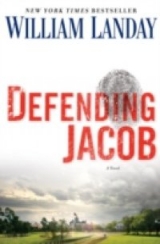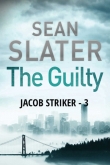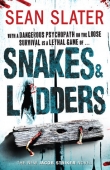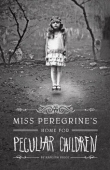
Текст книги "Defending Jacob"
Автор книги: William Landay
Соавторы: William Landay
Жанр:
Криминальные детективы
сообщить о нарушении
Текущая страница: 15 (всего у книги 25 страниц)
23
Him Northern Correctional Institution, Somers, Connecticut.
The visiting booth at Northern seemed designed to disorient and isolate. A claustrophobic sealed white box, about five feet wide by eight feet deep, with a windowed door behind me and a plate-glass window in front. A beige dial-less phone on the wall at my right hand. A white counter to rest my arms on. The booth was designed to keep the prisoners caged in, of course: Northern was a level-five maximum security facility that permitted only no-contact visits. But it was I who felt entombed.
And when he appeared in the window-my father, Bloody Billy Barber-hands cuffed at his waist, a tangle of ash gray hair, smirking down at me-amused, I suppose, at his pissant kid showing up here finally-I was glad for the thick glass slab between us. Glad that he could see but not reach me. The leopard in the zoo wanders to the edge of his pen and, through the bars or across an unjumpable moat, he stares at you with contempt for your inferiority, for needing that barrier between you. There is a shared understanding in that moment, nonverbal but no less real: the leopard is predator and you are prey, and it is only the barrier that permits us humans to feel superior and secure. That feeling, standing at the leopard’s cage, is edged with shame, at the animal’s superior strength, at his hauteur, his low estimation of you. To my own surprise, what I felt in those first moments in my father’s presence was precisely the zoo-goer’s subtle shame. The surge of emotion took me by surprise. I had not expected to feel much of anything. Let’s be honest: Billy Barber was a stranger to me. I had not seen him in forty-five years or so, since I was a kid. But I could not have been more frozen by him. He held me as surely as if he had somehow materialized on my side of the glass and wrapped me in his arms.
He stood there framed in the window, a three-quarter-length portrait of an old con, his eyes on me. He gave a little snort.
I broke eye contact, and he sat down.
A guard stood several feet behind him, near the blank wall. (Everything was blank, every wall, every door, every surface. From what I could see, Northern C.I. seemed to be made up entirely of unbroken white plaster walls and gray concrete walls. The facility was new, completed only in 1995, so I assumed the lack of color was part of some crazy-making penal strategy. After all, it is no harder to paint a wall yellow or blue than white.)
My father picked up his phone-even as I write the words my father I feel a little thrill, and my mind reverses the film of my life back to 1961 when I last saw him, in the visiting room at the Whalley Avenue jail; that is the moment of divergence, the whole contingent, ramifying course of our two lives begins there-and I picked up my phone.
“Thanks for seeing me.”
“They’re not exactly standing in line.”
On his wrist was the blue tattoo I had remembered for so many years. It was actually quite small and indistinct, a little fuzzy-edged crucifix that had darkened with age to plum purple, like a deep bruise. I had misremembered it. I had misremembered him: he was only average height, thin, more muscular now than I’d imagined. Ropy jail-house muscles, even at seventy-two. He had picked up a new tattoo as well, much more intricate and artful than the old one: a dragon that coiled itself around his neck so that its tail and snout met at the base of his throat like a necklace pendant.
“About time you come see me.”
I sniffed. The risible suggestion that his feelings were hurt, that he was the victim here, pissed me off. What balls. Typical con, this guy was-always wheedling, angling, gaming.
“What’s it been,” he went on, “a whole life? A whole life I’m rotting away and you don’t have time to come see your old man. Not even once. What kind of kid are you? What kind of kid does that?”
“You practice that speech?”
“Don’t smart-mouth me. What’d I ever do to you? Huh? Nothing. But a whole life you never come see me. Your own father. What kind of kid doesn’t visit his own father for forty years?”
“I’m your son. That should explain it.”
“My son? Not my son. I don’t know you. Never laid eyes on you.”
“Want to see my birth certificate?”
“Like I give a shit about a fuckin’ birth certificate. You think that’s what makes a son? One squirt fifty years ago, that’s what you are to me. What’d you think? I’d be happy to see you? Did you think I’d be jumping up and down, whoop-dee-fuckin’-doo?”
“You could have said no. I wasn’t on your visitor list.”
“No one’s on my fuckin’ list. Whattaya think? Who would be on my fuckin’ list? They don’t let people visit here anyway. Just immediate family.”
“You want me to leave?”
“No. Did you hear me say that?” He shook his head, frowned. “This fuckin’ place. This place is the worst. I haven’t been here the whole time, you know. They move me around. You do bad somewheres else, they send you here. It’s a hole.”
He seemed to lose interest in the subject and he fell silent.
I did not speak. I have found in any Q amp;A, in court, in witness interviews, wherever, often the best thing you can do is wait, say nothing. The witness will want to fill the awkward silence. He will feel a vague compulsion to keep talking, to prove he is not holding back, to prove he is smart and in the know, to earn your trust. In this case, I think, I waited just out of habit. Certainly I had no intention of leaving. Not until he said yes.
His mood shifted. He slumped. Almost visibly, he went from petulant to resigned, even self-pitying.
“Well,” he said, “you came out big, at least. She must’ve fed you good.”
“She did fine. With everything.”
“How is she, your mother?”
“What do you give a shit?”
“I don’t.”
“So don’t talk about her.”
“Why shouldn’t I?”
I shook my head.
“I knew her before you did,” he said. He squirmed in his chair with a leer, wiggled his hips, mimed fucking her.
“Your grandson is in trouble. Did you know that?”
“Did I-? I didn’t even know I had a grandson. What’s his name?”
“Jacob.”
“Jacob?”
“What’s so funny?”
“The fuck kind of faggot name is Jacob?”
“It’s a name!”
Bouncing with laughter, he sang in falsetto, “Jaaaacob!”
“Watch your mouth. He’s a good kid.”
“Yeah? Can’t be that good or you wouldn’t be here.”
“I said watch your mouth.”
“What’s little Jacob in trouble for?”
“Murder.”
“Murder? Murder. How old is he?”
“Fourteen.”
My father lowered the phone to his lap and slumped back in his chair. When he sat back up again, he said, “Who’d he kill?”
“No one. He’s innocent.”
“Yeah, so am I.”
“He’s really innocent.”
“Okay, okay.”
“You never heard anything about this?”
“I never hear about anything in here. This place is a toilet.”
“You must be the oldest con in here.”
“One of ’em.”
“I don’t know how you survive it.”
“You can’t hurt steel.” The handcuffs forced him to raise both arms as he held the phone in his left hand, and he flexed his unoccupied right arm. “You can’t hurt steel.” But then his bravado vanished. “This place is a hole,” he said. “It’s like living in a fuckin’ cave.”
He had a way of swinging between the two poles of hyper-machismo and self-pity. It was hard to tell which one was a put-on. Maybe neither was. On the street this sort of emotional volatility would have seemed crazy. In here, who knew? Maybe it was a natural reaction to this place.
“You put yourself in this place.”
“I put myself in this place and I’m doing my bid and I’m not complaining. You hear me complaining?”
I did not answer.
“So what d’you want outa me? You want me to do something for poor innocent little Jacob?”
“I may want you to testify.”
“Testify to what?”
“Let me ask you something. When you killed that girl, what did it feel like? Not physically. I mean, what was in your mind, what were you thinking about?”
“What do you mean, what was I thinking about?”
“Why did you do it?”
“What do you want me to say? You tell me.”
“I just want you to tell the truth.”
“Yeah, right. Nobody wants that. Especially the people who tell you they want the truth-trust me, they don’t want the truth. You tell me what you want me to say to help the kid out and I’ll say it. I don’t give a shit. What do I give a shit?”
“Let me put it this way. When it happened, were you thinking anything? Anything at all? Or was it kind of an irresistible impulse?”
The corner of his mouth curled upward. “An irresistible impulse?”
“Just answer.”
“Is that what you’re going for?”
“Never mind what I’m going for. I’m not going for anything. Just tell me what you felt.”
“I felt an irresistible impulse.”
I exhaled loud and long. “You know, if you were a better liar, you might not be in here.”
“If you weren’t such a good liar, you might not be out there.” He eyed me. “You want me to help get the kid off, I’ll help you. He’s my grandkid. Just tell me what you need.”
I had already decided Bloody Billy Barber was not going to come within ten miles of the witness stand. He was worse than a liar-he was a bad liar.
“All right,” I said, “you want to know what I came for? This is what I came for.” I held up a little packet: a sterile swab and a plastic envelope to hold it. “I need to wipe your gums with this. For DNA.”
“The guards won’t let you.”
“Let me worry about the guards. I need you to let me.”
“What do you need my DNA for?”
“We’re testing for a certain mutation. It’s called MAOA Knockout.”
“What in the fuck is MAOA Knockout?”
“It’s a genetic mutation. They think it might code your body to be more aggressive in certain environments.”
“Who thinks that?”
“Scientists.”
His eyes narrowed. You could practically read his thoughts, the selfish opportunism of a career con: maybe here was an argument to flip his own conviction.
“The more you talk, the more I think maybe Jacob isn’t so innocent.”
“I didn’t come here to hear your opinion. I came to get your spit on this Q-tip. If you say no, I’ll go get a court order and come back and we’ll take it the hard way.”
“Why would I say no?”
“Why would you do anything? Guys like you I don’t understand.”
“What’s to understand? I’m the same as anyone else. Same as you.”
“Yeah, okay, whatever.”
“Don’t give me ‘okay, whatever.’ Did you ever stop to think that without me you wouldn’t exist?”
“Every day.”
“See? There.”
“It’s not a happy thought.”
“Well, I’m still your old man, kiddo, whether you like it or not. It don’t have to make you happy.”
“It don’t.”
After some negotiation and a call to the deputy warden, a deal was struck. I would not be allowed to swab my father’s mouth personally, which would have been the best method because it would create the cleanest chain of custody: I could testify that the sample was genuine because the Q-tip never left my possession. Not at Northern. “No contact” meant no contact. At length, I was allowed to give the kit to a guard, who passed it to my father.
I talked him through the procedure step by step on the phone in the visiting booth. “All you have to do is break open the package and wipe the Q-tip around your cheek a little. Just so it soaks up a little spit. Swallow first. Then wipe it on the inside of your cheek near the back of your mouth, back where your jaws meet. Then I want you to put the Q-tip in that plastic bottle there, without touching the tip to anything else, then screw the top on. Then I want you to put that label across the top, and sign and date the label. And I need to be able to watch you do all that, so don’t block me.”
With his hands still cuffed, he ripped open the paper package holding the swab. It was a long wooden stick, longer than an ordinary Q-tip. He put the swab straight into his mouth like a lollipop and he pretended to bite it. Then, looking at me through the window, he bared his teeth and wiped the cotton tip across his upper front gums. Then he swirled it around at the back of his mouth, in the pocket of his cheek. He held the stick up to the window.
“Now you.”
Part THREE
“I have in mind an experiment. Take an infant-regardless of ancestry, race, talent, or predilection, so long as he is essentially healthy-and I will make of him whatever you like. I will produce an artist, soldier, doctor, lawyer, priest; or I will raise him to be a thief. You may decide. The infant is equally capable of all these things. All that is required is training, time, and a properly controlled environmment.”
– John F. Watkins, Principles of Behaviorism (1913)
24
It’s Different for Mothers
For years I never expected to lose in court. In practice, I did lose, of course. Every lawyer loses, just as every baseball player makes an out seventy percent of the time he goes to bat. But I was never intimidated, and I spat on prosecutors who were-the politicians and wheeler-dealers who were afraid to try a case that was not a sure thing, who would not risk a not-guilty. To a prosecutor, there is no dishonor in a not-guilty, not when the alternative is a sleazy deal. We are not measured by simple won-lost records. The truth is, the best won-lost records are not built on great trial work. They are built on cherry-picking only the strongest cases for trial and pleading out the rest, regardless of the right and wrong of it. That was Logiudice’s way, not mine. Better to fight and lose than sell out your victim.
That is one reason I loved homicides. You cannot plead guilty to murder in Massachusetts. Every case must go to trial. The rule is a remnant of the days when murder was punishable by death in this state. In a capital case, no shortcuts were permitted, no deals. The stakes were simply too high. So to this day every homicide case, no matter how lopsided, must be tried. Prosecutors cannot cherry-pick the sure winners for trial and the long shots to dump. Well, I liked to think, so much the better. Then the difference will be me. I will win even with the weaker case. That was how I saw it. But then, we all tell ourselves stories about ourselves. The money man tells himself that by getting rich he is actually enriching others, the artist tells himself that his creations are things of deathless beauty, the soldier tells himself he is on the side of the angels. Me, I told myself that in court I could make things turn out right-that when I won, justice was served. You can get drunk on such thinking, and in Jacob’s case I was.
As the trial approached, I felt a familiar battlefield euphoria. It never crossed my mind that we would lose. I was energized, optimistic, confident, pugnacious. All of it in hindsight seems strangely disconnected from reality. But it is not so strange, if you think about it. Treat a man like an anvil and he will long to hit back.
The trial began in mid-October 2007, at the height of leaf season. Soon the trees would release their leaves all at once, but for the moment the foliage was in its final brilliant efflorescence of red, orange, and mustard.
On the eve of the trial, a Tuesday night, the air was unseasonably warm. The overnight temperature did not fall much below sixty degrees, and the air was dense, humid, agitated. I woke up in the middle of the night, sensing something wrong in the atmosphere, as I always do when Laurie cannot sleep.
She was lying on her side, up on one elbow, head propped in her hand.
“What’s wrong?” I whispered to her.
“Listen.”
“To what?”
“Sh. Just wait, listen.”
Outside, the night rustled.
There was a loud screech. It began as an animal’s yelp then quickly rose into a piercing high-pitched shriek, like the screel of a train’s brakes.
“What on earth is that?” she said.
“I don’t know. A cat? A bird maybe? Something is killing it.”
“What would be killing a cat?”
“A fox, a coyote. Raccoon, maybe.”
“It’s like we live in the woods, all of a sudden. This is the city! I’ve lived here all my life. We never had foxes and coyotes. And those huge wild turkeys we get in the yard? We never had any of that.”
“There’s a lot of new development. The town’s getting built up. Their natural habitats are disappearing. They’re getting flushed out into the open.”
“Listen to that sound, Andy. I can’t even tell what direction it’s coming from or how far away it is. It’s like it’s right next to us. It must be one of the neighbors’ cats.”
We listened. It came again. This time the dying animal’s screeches definitely sounded like a cat. The cry began recognizably as a cat’s mewling before the wild, electrified shrieks began.
“Why is it taking so long?”
“Maybe it’s toying with its prey. Cats do that with mice, I know.”
“It’s awful.”
“It’s nature.”
“To be cruel? To torture your prey before you kill it? How is that natural? What evolutionary advantage does cruelty give?”
“I don’t know, Laurie. It’s just the way it is. Whatever would attack a cat like that-some starving coyote or wild dog or whatever-I’m sure it’s desperate. It can’t be easy to hunt around here.”
“If he’s desperate, then he should kill it and eat it already.”
“Why don’t we try to get some sleep. We’ve got a big day tomorrow.”
“How can I sleep with that?”
“You want one of my Ambien?”
“No. They knock me out all the next morning. I want to be alert tomorrow. I don’t know how you take those things.”
“Are you kidding? I eat them like Tic Tacs. They don’t knock me out enough.”
“I don’t need pills, Andy. I just want that sound to stop.”
“Come on, lie down.”
She let her head down. I folded my body against her back, and she seated herself against me.
“You’re just nervous, Laurie. It’s understandable.”
“I don’t know if I can do this, Andy. Really, I don’t have the strength.”
“We’ll get through it.”
“It’s easier for you. You’ve seen the whole process before. And you’re not a mother. Not that this is easy for you. I know it’s not. But it’s different for me. I just can’t do it. I’m not going to make it.”
“I wish I could make it go away for you, Laurie, but I can’t.”
“No. This helps, anyway, what you’re doing now. We’ll just lie here. It has to stop soon.”
The shrieks went on for another fifteen minutes or so. Neither of us slept much even after they stopped.
When we emerged from our house at eight o’clock the next morning, a Fox 25 news van idled across the street, smoke wisping from the tailpipe. A cameraman filmed us as we walked to the car. He was faceless behind his shoulder-held camera. Or rather, the camera was his face, his one-eyed insect head.
Outside the courthouse in Cambridge, we made our way to the front entrance on Thorndike Street, where reporters swarmed. Again they bumbled against one another as we came up the block. Again the cameras jostled for a clear shot, again the microphones probed the air in front of us. The crush of reporters was much easier to deal with this time, having been through it once before at the arraignment. Jacob’s presence excited them most, but I was oddly thankful that Jacob had to run this gauntlet. I had a theory that it was always better for a defendant to be bailed and out on the street than to be held in the pretrial lockup, as most of my own murder defendants had been. Defendants who did not make bail seemed to leave the building only one way, via the prisoners’ exit-heading for Concord, not home. Those prisoner-defendants moved down through the courthouse, like meat through a grinder or like the steel balls that bounce down a pachinko machine: from the jail on the top floors, down through the various courtrooms, finally out through the basement-level garage, where the sheriff’s vans carted them off to the various prisons. Better that Jacob walk in through the front door, better that he retain his freedom and dignity as long as possible. Once this building caught you in its gears, it did not like to let go.
25
The Schoolteacher, Glasses Girl, the Fat Somerville Guy, Urkel, the Recording Studio Guy, the Housewife, Braces Woman, and Other Oracles of Truth
I n Middlesex County, judges were ostensibly assigned to trials at random. No one actually believed such a lottery existed. The same few judges were assigned high-profile cases over and over, and the judges who kept drawing the winning lottery tickets tended to be prima donnas-just the sort who would lobby for the gig behind the scenes. But no one ever complained. Bucking the entrenched routines of that courthouse was generally an exercise in pissing upwind, and anyway the self-selection of egomaniacal judges probably was for the best. It takes a healthy dose of ego to keep command of a contentious courtroom. That and it made for a better show: big cases need big personalities.
So it came as no surprise that the judge assigned to Jacob’s trial was Burton French. Everyone knew he would be. The hairnetted cafeteria ladies, the mental-patient janitors, even the mice that scratched around behind the ceiling tiles all knew that, if a TV camera was going to be in the courtroom, the judge on the bench would be Burt French. He was very likely the only judge whose face the public recognized, as he appeared often on the local news shows to dilate on matters legal. The camera loved him. In person he had a slightly laughable Colonel Blimp appearance-a wine-cask body supported uncertainly by two wiry legs-but as a talking head on the TV screen he projected the sort of reassuring gravity we like to see in our judges. He spoke in definitive declarations, none of the “on the one hand, on the other hand” that journalists rely on. At the same time he was never bombastic; he never seemed to be faking or provoking, manufacturing the “heat” that TV loves. Rather, he had a way of using his square, serious face, of tucking in his chin and leveling his eyes at the camera and saying things like “The Law does not permit [this or that].” You could hardly blame viewers for thinking, If The Law could talk, this is what it would sound like.
What made all this so unbearable to the lawyers who gathered to gossip before the First Session every morning or over lunch at the Cinnabon in the Galleria food court was that Judge French’s gruff no-bullshit attitude was itself pure bullshit. The man who presented himself in public as the embodiment of The Law, they thought, was in reality a publicity seeker, an intellectual lightweight, and in the courtroom a petty tyrant. Which made him the perfect embodiment of The Law, when you really thought about it.
Of course by the time Jake’s trial began I did not give a rat’s ass about Judge French’s failings. All that mattered was the game, and Burt French was an advantage to us. He was essentially conservative, not the sort of judge to go out on a limb for a novel legal theory like the Murder Gene. Equally important, he was the sort of judge who liked to test the lawyers who appeared before him. He had a bully’s instinct for weakness or uncertainty, and he loved to torment bumbling, unprepared lawyers. Throwing Neal Logiudice in front of a guy like that was chumming the water, and Lynn Canavan made a mistake by doing it in such an important case. But then, what choice did she have? She could not send me anymore.
So it began.
But it began-as is often the case with an event you have anticipated too eagerly for too long-with a sense of anticlimax. We waited in the crowded gallery of courtroom 12B as the clock spun past nine o’clock, nine-fifteen, nine-thirty. Jonathan sat beside us, unfazed by the delay. He checked in with the judge’s clerk a few times, only to be told each time that there were delays in setting up the pool camera whose video feed the news stations, including Court TV, were to share. Then we waited awhile longer while the larger-than-usual jury pool which we had reserved was being organized. Jonathan reported these things to us, then opened up his New York Times and read peacefully.
At the front of the courtroom, Judge French’s clerk, a woman named Mary McQuade, fiddled with some papers; then, satisfied, she stood and surveyed the chamber with crossed arms. I always got along with Mary. I made it my business to. The court clerks were gatekeepers to the judges and therefore influential. Mary in particular seemed to enjoy the secondhand prestige of her position, the nearness to power. And the truth is, she did her job well, brokering between Judge French’s blustering and the lawyers’ constant jockeying for advantage. The word bureaucrat has a negative connotation, but we do need bureaucracies, after all, and it is good bureaucrats that make them go. Mary certainly made no apologies for her place in the system. She wore expensive, stylish eyeglasses and decent suits, as if to separate herself from the hacks in the other courtrooms.
In a chair along the far wall was the court officer, an enormous fat man named Ernie Zinelli. Ernie was sixty-odd years old and three hundred-odd pounds, and if there was ever actually trouble in the courtroom, the poor guy would probably keel over of a heart attack. His presence as the judge’s enforcer was purely symbolic, like the gavel. But I loved Ernie. Over the years he had grown increasingly open with me about his opinions of defendants, which were generally unfavorable in the extreme, and about judges and lawyers, which were only slightly more positive.
That morning, these two old colleagues of mine barely acknowledged me. Mary glanced in my direction occasionally but gave no sign she had ever seen me before. Ernie risked a little grin. They seemed afraid someone might think that any friendly gestures were directed at Jacob, who sat beside me. I wondered if they had been instructed to ignore me. Probably they just figured I had joined the other team.
When the judge finally did take the bench a little before ten, we were stiff from sitting.
Everyone stood at Ernie’s recital of the familiar “Oyez, oyez, oyez, the Superior Court of the Commonwealth of Massachusetts is now in session,” and Jacob fidgeted right through to the end: “All ye having business before this court come forward and ye shall be heard.” His mother and I both put a hand on Jacob’s back to reassure him.
The case was called, Jonathan gestured to Jacob, and the two of them crossed the bar and took their seats at the defense table, as they would every morning for the next two weeks.
This would be Laurie’s view of the entire trial. From the front row of the gallery benches, she would sit impassively for hour after hour, day after day, staring at the back of Jacob’s head. Poised on that bench, my wife looked very pale and thin among the spectators, as if Jacob’s case was a cancer that she had to endure, a physical struggle. And yet, no matter how she withered, I could not help seeing in Laurie the ghost of her younger self, the teenaged girl with a lovely, full, heart-shaped face. I have an idea that this is what enduring love really means. Your memories of a girl at seventeen become as real and vivid as the middle-aged woman sitting in front of you. It is a happy sort of double vision, this seeing and remembering. To be seen this way is to be known.
Laurie was miserable sitting there. The parents of young defendants have been consigned to a peculiar purgatory in these trials. We were expected to be present but silent. We were implicated in Jacob’s crime as both victims and perpetrators. We were pitied, since we had done nothing wrong. We had just been unlucky, lost the pregnancy lottery, and been stuck with a rogue child. Sperm + egg = murderer-something like that. Can’t be helped. At the same time we were despised: somebody had to be responsible for Jacob, and we had created the boy and raised him-we must have done something wrong. Even worse, now we had the gall to support the killer; we actually wanted to see him get away with it, which only confirmed our antisocial nature, our bone-deep badness. Of course, the public view of us was so contradictory and jumped-up with emotion that there was no way to answer it, no right way to act. People would think what they wanted, they would imagine for us whatever sinister or suffering interior life they chose. And for the next two weeks Laurie would play her part. She would sit there at the back of the courtroom as still and expressionless as a marble statue. She would watch the back of her son’s head, trying to interpret the tiniest micromovements. She would react to nothing. It did not matter that once she had held that baby boy in her arms and whispered in his ear, “Sh, sh.” At this point, nobody gave a shit.
When he finally took the bench, Judge French scanned the room as the clerk read out the case: “Number oh-eight-dash-four-four-oh-seven, Commonwealth v. Jacob Michael Barber, a single count of murder in the first degree. For the defendant, Jonathan Klein. For the Commonwealth, Assistant District Attorney Neal Logiudice.” The judge’s handsome, grave face settled briefly on each of the players, Jacob, the lawyers, even us, conferring on each a momentary significance while we were in his gaze, which vanished as soon as his eyes swept on.
Over the years I had tried many cases before Judge French, and although I thought he was a bit of an empty suit, I liked him well enough. He had been a football player at Harvard, a defensive lineman. In his senior year he had fallen on a fumble in the end zone against Yale, and this singular brilliant moment had stuck with him. He kept a framed picture of it on his office wall, big Burt French in his crimson and gold uniform lying on his side on the ground, cuddling the precious egg he’d found. I suspect the picture struck me differently than it did Judge French. To me, he was the sort of guy such things happened to. Rich and good-looking and all the rest, no doubt opportunities had always presented themselves like so many footballs lying in his way and he had merely to fall on them, all the while presuming his good fortune was the natural product of his talent. One wonders how a charmed man like him would have been affected by a father like Bloody Billy Barber. All that ease, all that naturalness, all that credulous self-confidence. For years I had studied men like Burt French, despised them, copied them.
“Mr. Klein,” the judge said, slipping on a pair of half-glasses, “any preliminary motions before we begin the voir dire?”
Jonathan stood. “A couple of things, Your Honor. First, the defendant’s father, Andrew Barber, would like to enter an appearance in the case on the defendant’s behalf. With the court’s permission, he is going to second-chair me at the trial.”








